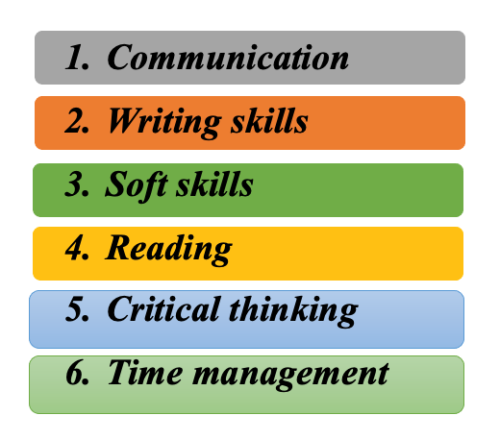The importance of study skills in HE for learners to enhance and develop their studies further
Article Date | 9 March, 2022By Giedrius Zilionis, Senior Business Lecturer and Alexander Kaiser, Health Lecturer

.

.
Study skills are some of the most essential academic tools in Higher Education. All learners have different skills and sometimes these are not fully recognised or developed – simply because, ironically, study skills are not implemented. By effectively using study skills, learners can discover hidden talents and how well these can be of benefit to them during their studies and beyond.
Benefits of academic skills
There are discussions as to whether or not academic skills should be prioritised in the teaching of undergraduate students, since employers argue that many students are not equipped with the job-related skills that are needed, even after 3 years of degree education (Menz, 2021). However, according to Hermida (2009) most first-year students lack necessary basic academic skills such as reading, because academic reading differs greatly from the reading that is undertaken in Secondary Education. Students need to learn academic language and familiarise themselves with the key contributors to their respective fields. Others such as Blades and Gibb (2012) argue that academic skills such as taking responsibility, undertaking research and communicating findings are important when it comes to employability.
Why do we need skills?
Skills are necessary for every aspect of human life. These skills allow us to do something right and well. Skills are learned and developed in academia and work practices. Simply, if a student develops skills well in a particular field they can become an expert in it. Students start learning some key skills at the beginning of their degree which will help them later in their professional life, career and opportunities. Students will have more confidence, motivation, engagement and achieve goals. Therefore, using a skill-based approach can help students grasp concepts faster and strengthen what they already know (Podareducation, 2021.)
Below are additional essential skills that will help students thrive instead of ‘survive’ at LSST.

.
Transferable skills
In general, transferrable skills are referred to as skills that can be used in a variety of situations. Transferrable skills include basic skills such as literacy and numeracy skills but also extend to what some authors call “employability skills”. These skills are those which provide students with the skills to enhance their chances of getting employed. This includes skills that are non-job-specific (Blades and Gibb, 2012). A large part of employability depends on language efficiency, digital competence as well as social skills and social awareness (Nägele, Stadler, 2017).
This is why at LSST, students are encouraged to begin their development of these skills from the start of their programme where respective modules allow students to develop their academic skills while focusing on a range of challenges that help develop employability skills. For example, students need to familiarise themselves with IT systems, work in multi-cultural groups and come to know about how to learn efficiently. Particularly, group work allows students to explore their leadership skills, time-management skills and sometimes conflict management is needed. Further, students are supported by the academic team to do all these things in a stimulating and safe environment. They are constantly instructed to attempt tasks that lie just outside their abilities before they are assisted to hone their skills.
Digital skills
This digital and technology-driven world requires students to learn digital skills. Degrees are one of the starting points where learners can start or improve their digital skills intensely. Students must use some digital skills during their studies, such as information/data literacy (browsing, searching, and evaluating data); communication and collaboration (interaction via ICT, emails, chats, blogs); digital content creation (programming and copyrights licensing); and problem-solving (technical problems identifying and solving). See CEDEFOP (2021).
Developing and maintaining digital skills is vital in today’s teaching and learning process. Students can enhance their digital skills through learning – online and activities in class. It is essential to learn digital skills from L3 at LSST digital skills usage will lead learners throughout their studies and personal lives.
As educators, we have to support students to recognise the importance of digital skills in the classroom to assister their learning and their employability - and encourage them to build the confidence to transfer their skills to multiple contexts. Digital skills enable educators and learners to move forward in their professional careers. The importance of skills is necessary for every aspect of human being life. The skills allow us to do something right and well.
Students that start learning and practising key study skills at the beginning of their degree will have more confidence, motivation, engagement and achieve more goals. Therefore, using a skill-based approach can help students grasp concepts faster and strengthen what they already know (Podareducation, 2021.) Learning and improving current skills makes students better communicators too.
Computer skills
Unlike digital skills, computer user skills are those basic skills that are needed to use computers generally. Computer skills are needed at LSST to assess course material, search for information and access online libraries. Basic computer skills are also needed to write assignments and can be beneficial to stay in touch with lecturers and other students, for example for sharing ideas and formulating opinions. Efficient use of email is essential in today’s world. Some students, may not have all of the required skills yet. Further, research shows that non-traditional students often tend to put in more effort to compensate for this initial lack of skills (Henson, 2013).
All modern businesses are reliant on the efficient computer skills of their employees. Computers are not only used by businesses around the world to complete tasks but are also essential in a fast-moving world as they can be used to plan and organise a variety of tasks more efficiently in a world in which job tasks become more and more versatile. At LSST students have access to IT equipment and can make use of academic support services which may help with the development of IT skills.
Literacy skills
Literacy is the ability to read, write, speak, and listen in a way that lets us communicate effectively and make sense of the world. According to Unesco (2020), 14% of adults still lack basic literacy skills globally.
In England, 1 in 7 adults, roughly 5.1 million, lack basic literacy skills. England is the only developed country where the literacy and numeracy levels of 16-24 years old are worse than those at 55-65 years old. 43% of adults 16-years and older read at or below the basic level. Their skills are limited to understanding short, simple texts and one-step math problems. (Seedsofliteracy.org, 2015).
Many adults want to improve their literacy skills to get higher-paying jobs. Acquiring stronger literacy skills can open up new careers and often lead to work promotions. Sometimes motivation comes from children who are learning to read themselves.
Improving literacy skills is vital. At LSST, we have several modules such as Preparing for Success, Knowledge and Creativity; Self-development and Responsibility, and Inquiry Based Learning, where students learn the literacy skills to enhance their academic performance further and progress to the next level. Students learn, read, write, present, communicate, and reflect skills during their studies. Regardless of the skills students are needed, lacking literacy skills holds a person back at every stage of their life.
Self-development skills
To best support students, it is imperative to understand their motivation to study in Higher Education. More students than ever are beginning to study after a prolonged period of employment (Rozvadska, Novotny, 2019). As opposed to traditional students, non-traditional students more often state financial concerns as motivating factors for studying. They also often are more concerned about academic issues than their traditional counterparts. Further, social issues, such as lack of confidence appear to be more prevalent with non-traditional students (Taylor, House, 2010). In practice, it is important to support students at LSST in a variety of ways. They should be confident that they receive necessary financial support before commencing their studies but it is also important to teach skills that increase self-confidence, such as time-management skills and organisational skills. It has been shown that positive teaching is effective in student empowerment (e.g. Joseph, Murphy, Holford, 2020). As a result, LSST adopts a facility of teachers as facilitators rather than directional teachers, where possible. Students are supported in class but also have access to resources that are designed to support students with social issues as well as financial issues. For example, students are assigned a personal academic tutor, can receive guidance on mental health and can be supported by a dedicated academic support team.
In conclusion, study skills are a fundamental part of academic, professional and personal development. Furthermore, learners can develop these skills at LSST in conjunction with their experience. Additionally, enthusiasm to study and learn skills enhances student confidence and self-assurance. We must all work together to further improve student study skills and learning strategies by making our teaching and learning even more effective and successful.
How to reference this article
Zilionis, G. and Kaiser, A. G. (2022). The importance of study skills in HE for learners to enhance and develop their studies further in academia. Available at: https://www.lsst.ac/blogs/ [Note: Please add accessed date here].
References
Blades, R., Fauth, B., Gibb, J. (2012). ‘Measuring employability skills. A rapid review to inform development of tools for project evaluation’. National Children’s Bureau. London.
CEDEFOP. (2021). Digital skills: Challenges and opportunities. [online] Available at: https://www.cedefop.europa.eu/en/data-insights/digital-skills-challenges-and-opportunities. [Accessed 7 Feb. 2022].
Henson, A.R. (2013). ‘The impact of Computer Efficacy on the Success of the Nontraditional Community College Student’. Dissertations, 301.
Hermida, J. (2009). ‘The Importance of Teaching Academic Reading Skills in First-Year University Courses. Available at: https://ssrn.com/abstract=1419247 [Accessed 7 Feb. 2022].
Menz, M. (2020). ‘Integrating Academic Skills and Employability’. Journal of Research in Higher Education. 4(2), 5-17 doi: 10.24193/JRHE.2020.2.1
Joseph, S., Murphy, D., Holford, J. (2020). ‘Positive education: A new look at Freedom to Learn. Oxford Review of Education, 46(5). 549-562
Nägele, C., Stadler, B.E. (2017). ‘Competence and the Need for Transferable Skills’ in Competence- based Vocational and Professional Education, Springer International Publishing, Switzerland
Rozvadská, K., Novotný, P. (2019). The Structure of non-traditional students’ motives for entering higher education. Open Journal per la formazione in rete. 19(2). 133-148
Seedsofliteracy.org, (2015). The Importance of Adult Literacy | Seeds of Literacy. [online] Available at: https://www.seedsofliteracy.org/the-importance-of-adult-literacy/ [Accessed 7 Feb. 2022].
Podareducation.org. (2021). Importance of Skill Development Curriculum in School | Podar Blogs. [online] Available at: https://www.podareducation.org/blog-importance-of-skill-development-curriculum-in-school [Accessed 1 Feb. 2022].
Taylor, J., House, B. (2010). ‘An Exploration of Identity, Motivations and Concerns of Non-Traditional Students at Different Stages of Higher Education’ Psychology Teaching Review. 16(1). 46-57
Unesco.org. (2020). 14 per cent of adults worldwide still lack basic literacy skills, UNESCO report finds | UIL. [online] Available at: https://uil.unesco.org/literacy/14-cent-adults-worldwide-still-lack-basic-literacy-skills-unesco-report-finds. [Accessed 7 Feb. 2022].
Sharing is caring!





This article it is great!